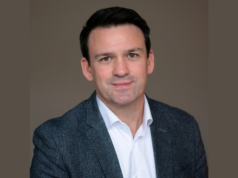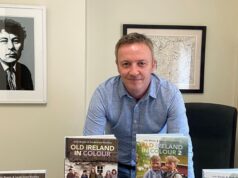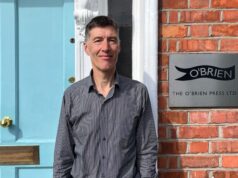‘Literary prizes are about marketing – many excellent writers never win anything’
Interview by Mary McCarthy
A successful cataract operation in 2006 had the extraordinary effect of unlocking my memories of growing up in the small town of Callan in Kilkenny as I began to vividly remember parts of my past that I had long forgotten.
In my memoirs, or my memory book,I include two pieces of prose fiction set in Kilkenny at the time of Cromwell and Hitler as I find historical fiction brings the past alive. I believe you need to invent a little in order to be able to retrieve the past.
My father was a police sergeant and a former IRA man and because he represented the law our family were set slightly apart in the town.
Growing up we never had enough money and my father’s gambling habit did not help. One passion my parents shared was that their ten children would get a good education and there was pressure on us to win scholarships. The first time I did my Leaving Cert I didn’t get one so I had to repeat it with the expectation that I would succeed next time. Luckily, I did and this enabled me to study at UCD.
Most writers are readers first and this is an important part of a writing career. Though it can be a negative thing if imitations are produced rather than allowing what you read to open up possibilities. You need to read avidly, absorb the style and then forget it when you start your own writing.
When I was a student in the 1950s I was passionate about great writers from the American South and the truth they spoke—Thomas Wolfe, William Faulkner, women writers such as Catherine Anne Porter and Carson McCullers. My brother’s friend was a customs officer and passed on the banned books to us which I would devour.
I spent a wonderful afternoon with the writer Flannery O’Connor in Georgia as part of a trip to the American South in the ’60s. She had debilitating lupus for much of her short life and was on crutches when I met her but in spite of this was full of vitality, telling stories with superb mimicry even though she must have been in pain. Her life was very similar to her writing about small town America but she completely transcended her illness.
The first time I wrote fiction was at St Kieran’s boarding school when I wrote a thriller in the study hall and passed it around chapter by chapter with each week ending on a cliffhanger.
I was aware of a wish to start writing but didn’t get going until well into the 1960s. Growing up, the town hall had many visiting theatre companies and something that has stayed with me was the time when the priests at my school brought in Anew McMaster—a very camp and colourful character—and he sat in front of us and staged Hamlet. I was struck by his performance and how it was only then that I realised the play was a fast-moving thriller. I had not got that from reading the text. That aspect really stayed with me—how the words can have a different life on the stage.
Cinema was a real discovery for me as an adolescent and I went to everything. This was my first contact with acting.
After the Second World War small towns in Ireland were introverted with the Church very authoritative. People led a highly regulated life and the culture was hostile to imaginative work. But people are people—they survive horrendous regulation and my childhood was happy with lot of play.
Today the speed of communication is unrecognisable to when I was starting out. I think it is making Irish writers freer. In the past there was a highly marked characterisation but today the presence of tradition is not as burdensome. Many Irish writers now have an international style. Comic writing is the exception and is still very Irish-flavoured and dependent on our unique use of language.
Friends and the memories I have shared with them are important to me. BrianFriel was a close friend and I cherish the memories of two trips to Russia and the Ukraine that we took together with our wives Anne and Julia. We visited Yalta, where Chekhov had a villa, and another house of his up the coast where he had retreated to write Three Sistersin 1900. Brian had adapted this play and for him to sit in the chair that Chekhov had sat in while he wrote it was so moving for him.
I find the writing of plays much more of a communal process than fiction.You are working with actors, directors, scene designers, composers, with everyone making contributions. I find this process fascinating and very stimulating and I would end up doing a lot of rewriting and reordering.Though some playwrights like Friel prefer to come to the rehearsal on the first day with a very finished text.
When you get to this collaborative stage you write quickly with pace. Prior to this I could spend three years thinking about a play, writing notes with ideas taking shape and changing all the time.
Writing comes at the end of a period of great creativity inside me. Writing is the record of that process going on at different levels.
A writing workshop will do what a very good editor will do: teach the technical stuff, and make suggestions for improvements. Some workshops are really good. John McGahern ran a fascinating workshop I had set up while teaching in Galway University and he used his own writing process as the subject matter to illuminate how he carved out his work.
Writers write out of their personal vision and style and you just cannot teach that.
I regard adaptation as a privileged conversation with the dead author and you can feel very close to them but this will only be successful if you can find your personal avenue into the work. In 1981 I adopted The Seagull and reset it in the late nineteenth century on an Anglo-Irish estate in the West of Ireland. But when Max Stafford-Clarke of the Royal Court Theatre in London approached me to do another of Chekhov’s works, The Cherry Orchard, I just could not find that personal groove into it. And I don’t think you can manufacture that.
Literary prizes are about marketing and not much about the quality of the writing. They are valuable in promoting your work and I will never turn one down. However, many excellent writers have never been picked out for prizes.
Some writers are good at Twitter and social media and good luck to them but I would be useless at marketing myself. Today’s world is market-driven and everything has a price attached to it. I would not be a skillful careerist as I find a lot of that side of publishing boring.
I don’t have a daily writing routine and I have always worked in intense bursts, and still do. There will be a long build up while ideas form in my head and then it’s full steam ahead. I work very intensively then and need to force myself to take breaks.
I will spend most of my summer in the United States but am returning to Callan in August when my novel The Big Chapel will be staged in an ambitious sort of street theatre and I’m very excited about that.
Thomas Kilroy’s memory book Over the Backyard Wall was published in 2018. by the Lilliput Press.

This Literary Life: interview series Mary McCarthy is a freelance journalist writing for a number of publications. She is an avid reader and an iron-willed book club administrator.











